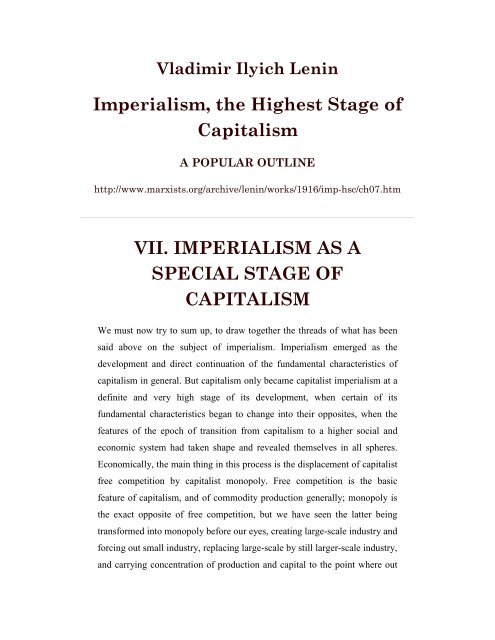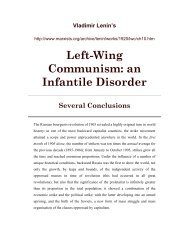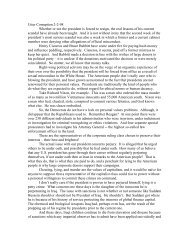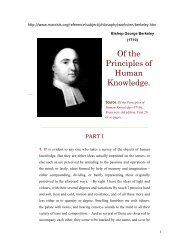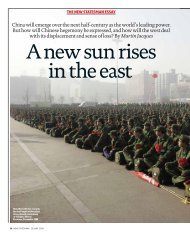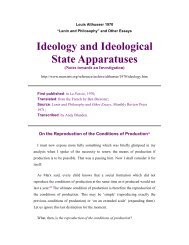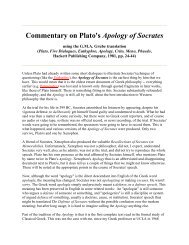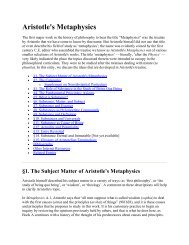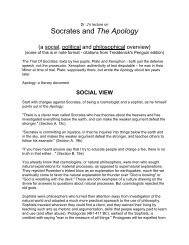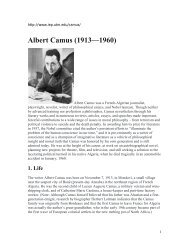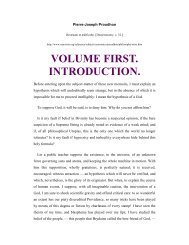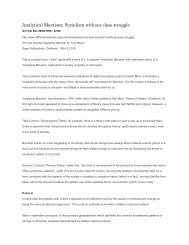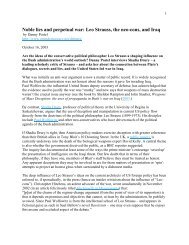Imperialism, the Highest Stage of Capitalism VII ... - Richard Curtis
Imperialism, the Highest Stage of Capitalism VII ... - Richard Curtis
Imperialism, the Highest Stage of Capitalism VII ... - Richard Curtis
Create successful ePaper yourself
Turn your PDF publications into a flip-book with our unique Google optimized e-Paper software.
Vladimir Ilyich Lenin<strong>Imperialism</strong>, <strong>the</strong> <strong>Highest</strong> <strong>Stage</strong> <strong>of</strong><strong>Capitalism</strong>A POPULAR OUTLINEhttp://www.marxists.org/archive/lenin/works/1916/imp-hsc/ch07.htm<strong>VII</strong>. IMPERIALISM AS ASPECIAL STAGE OFCAPITALISMWe must now try to sum up, to draw toge<strong>the</strong>r <strong>the</strong> threads <strong>of</strong> what has beensaid above on <strong>the</strong> subject <strong>of</strong> imperialism. <strong>Imperialism</strong> emerged as <strong>the</strong>development and direct continuation <strong>of</strong> <strong>the</strong> fundamental characteristics <strong>of</strong>capitalism in general. But capitalism only became capitalist imperialism at adefinite and very high stage <strong>of</strong> its development, when certain <strong>of</strong> itsfundamental characteristics began to change into <strong>the</strong>ir opposites, when <strong>the</strong>features <strong>of</strong> <strong>the</strong> epoch <strong>of</strong> transition from capitalism to a higher social andeconomic system had taken shape and revealed <strong>the</strong>mselves in all spheres.Economically, <strong>the</strong> main thing in this process is <strong>the</strong> displacement <strong>of</strong> capitalistfree competition by capitalist monopoly. Free competition is <strong>the</strong> basicfeature <strong>of</strong> capitalism, and <strong>of</strong> commodity production generally; monopoly is<strong>the</strong> exact opposite <strong>of</strong> free competition, but we have seen <strong>the</strong> latter beingtransformed into monopoly before our eyes, creating large-scale industry andforcing out small industry, replacing large-scale by still larger-scale industry,and carrying concentration <strong>of</strong> production and capital to <strong>the</strong> point where out
<strong>of</strong> it has grown and is growing monopoly: cartels, syndicates and trusts, andmerging with <strong>the</strong>m, <strong>the</strong> capital <strong>of</strong> a dozen or so banks, which manipulatethousands <strong>of</strong> millions. At <strong>the</strong> same time <strong>the</strong> monopolies, which have grownout <strong>of</strong> free competition, do not eliminate <strong>the</strong> latter, but exist above it andalongside it, and <strong>the</strong>reby give rise to a number <strong>of</strong> very acute, intenseantagonisms, frictions and conflicts. Monopoly is <strong>the</strong> transition fromcapitalism to a higher system.If it were necessary to give <strong>the</strong> briefest possible definition <strong>of</strong> imperialismwe should have to say that imperialism is <strong>the</strong> monopoly stage <strong>of</strong> capitalism.Such a definition would include what is most important, for, on <strong>the</strong> onehand, finance capital is <strong>the</strong> bank capital <strong>of</strong> a few very big monopolist banks,merged with <strong>the</strong> capital <strong>of</strong> <strong>the</strong> monopolist associations <strong>of</strong> industrialists; and,on <strong>the</strong> o<strong>the</strong>r hand, <strong>the</strong> division <strong>of</strong> <strong>the</strong> world is <strong>the</strong> transition from a colonialpolicy which has extended without hindrance to territories unseized by anycapitalist power, to a colonial policy <strong>of</strong> monopolist possession <strong>of</strong> <strong>the</strong>territory <strong>of</strong> <strong>the</strong> world, which has been completely divided up.But very brief definitions, although convenient, for <strong>the</strong>y sum up <strong>the</strong> mainpoints, are never<strong>the</strong>less inadequate, since we have to deduce from <strong>the</strong>msome especially important features <strong>of</strong> <strong>the</strong> phenomenon that has to bedefined. And so, without forgetting <strong>the</strong> conditional and relative value <strong>of</strong> alldefinitions in general, which can never embrace all <strong>the</strong> concatenations <strong>of</strong> aphenomenon in its full development, we must give a definition <strong>of</strong>imperialism that will include <strong>the</strong> following five <strong>of</strong> its basic features:(1) <strong>the</strong> concentration <strong>of</strong> production and capital has developed to such ahigh stage that it has created monopolies which play a decisive role ineconomic life; (2) <strong>the</strong> merging <strong>of</strong> bank capital with industrial capital, and <strong>the</strong>creation, on <strong>the</strong> basis <strong>of</strong> this “finance capital”, <strong>of</strong> a financial oligarchy; (3)<strong>the</strong> export <strong>of</strong> capital as distinguished from <strong>the</strong> export <strong>of</strong> commoditiesacquires exceptional importance; (4) <strong>the</strong> formation <strong>of</strong> international
monopolist capitalist associations which share <strong>the</strong> world among <strong>the</strong>mselves,and (5) <strong>the</strong> territorial division <strong>of</strong> <strong>the</strong> whole world among <strong>the</strong> biggestcapitalist powers is completed. <strong>Imperialism</strong> is capitalism at that stage <strong>of</strong>development at which <strong>the</strong> dominance <strong>of</strong> monopolies and finance capital isestablished; in which <strong>the</strong> export <strong>of</strong> capital has acquired pronouncedimportance; in which <strong>the</strong> division <strong>of</strong> <strong>the</strong> world among <strong>the</strong> international trustshas begun, in which <strong>the</strong> division <strong>of</strong> all territories <strong>of</strong> <strong>the</strong> globe among <strong>the</strong>biggest capitalist powers has been completed.We shall see later that imperialism can and must be defined differently ifwe bear in mind not only <strong>the</strong> basic, purely economic concepts—to which <strong>the</strong>above definition is limited—but also <strong>the</strong> historical place <strong>of</strong> this stage <strong>of</strong>capitalism in relation to capitalism in general, or <strong>the</strong> relation betweenimperialism and <strong>the</strong> two main trends in <strong>the</strong> working-class movement. Thething to be noted at this point is that imperialism, as interpreted above,undoubtedly represents a special stage in <strong>the</strong> development <strong>of</strong> capitalism. Toenable <strong>the</strong> reader to obtain <strong>the</strong> most wellgrounded idea <strong>of</strong> imperialism, Ideliberately tried to quote as extensively as possible bourgeois economistswho have to admit <strong>the</strong> particularly incontrovertible facts concerning <strong>the</strong>latest stage <strong>of</strong> capitalist economy. With <strong>the</strong> same object in view, I havequoted detailed statistics which enable one to see to what degree bankcapital, etc., has grown, in what precisely <strong>the</strong> transformation <strong>of</strong> quantity intoquality, <strong>of</strong> developed capitalism into imperialism, was expressed. Needlessto say, <strong>of</strong> course, all boundaries in nature and in society are conventional andchangeable, and it would be absurd to argue, for example, about <strong>the</strong>particular year or decade in which imperialism “definitely” becameestablished.In <strong>the</strong> matter <strong>of</strong> defining imperialism, however, we have to enter intocontroversy, primarily, with Karl Kautsky, <strong>the</strong> principal Marxist <strong>the</strong>oretician<strong>of</strong> <strong>the</strong> epoch <strong>of</strong> <strong>the</strong> so-called Second International—that is, <strong>of</strong> <strong>the</strong> twentyfiveyears between 1889 and 1914. The fundamental ideas expressed in our
definition <strong>of</strong> imperialism were very resolutely attacked by Kautsky in 1915,and even in November 1914, when he said that imperialism must not beregarded as a “phase” or stage <strong>of</strong> economy, but as a policy, a definite policy“preferred” by finance capital; that imperialism must not be “identified” with“present-day capitalism”; that if imperialism is to be understood to mean “all<strong>the</strong> phenomena <strong>of</strong> present-day capitalism”—cartels, protection, <strong>the</strong>domination <strong>of</strong> <strong>the</strong> financiers, and colonial policy—<strong>the</strong>n <strong>the</strong> question as towhe<strong>the</strong>r imperialism is necessary to capitalism becomes reduced to <strong>the</strong>“flattest tautology”, because, in that case, “imperialism is naturally a vitalnecessity for capitalism”, and so on. The best way to present Kautsky’s ideais to quote his own definition <strong>of</strong> imperialism, which is diametrically opposedto <strong>the</strong> substance <strong>of</strong> <strong>the</strong> ideas which I have set forth (for <strong>the</strong> objectionscoming from <strong>the</strong> camp <strong>of</strong> <strong>the</strong> German Marxists, who have been advocatingsimilar ideas for many years already, have been long known to Kautsky as<strong>the</strong> objections <strong>of</strong> a definite trend in Marxism).Kautsky’s definition is as follows:“<strong>Imperialism</strong> is a product <strong>of</strong> highly developed industrial capitalism. Itconsists in <strong>the</strong> striving <strong>of</strong> every industrial capitalist nation to bring under itscontrol or to annex all large areas <strong>of</strong> agrarian [Kautsky’s italics] territory,irrespective <strong>of</strong> what nations inhabit it.” [1]This definition is <strong>of</strong> no use at all because it one-sidedly, i.e., arbitrarily,singles out only <strong>the</strong> national question (although <strong>the</strong> latter is extremelyimportant in itself as well as in its relation to imperialism), it arbitrarily andinaccurately connects this question only with industrial capital in <strong>the</strong>countries which annex o<strong>the</strong>r nations, and in an equally arbitrary andinaccurate manner pushes into <strong>the</strong> forefront <strong>the</strong> annexation <strong>of</strong> agrarianregions.
<strong>Imperialism</strong> is a striving for annexations—this is what <strong>the</strong> political part <strong>of</strong>Kautsky’s definition amounts to. It is correct, but very incomplete, forpolitically, imperialism is, in general, a striving towards violence andreaction. For <strong>the</strong> moment, however, we are interested in <strong>the</strong> economic aspect<strong>of</strong> <strong>the</strong> question, which Kautsky himself introduced into his definition. Theinaccuracies in Kautsky’s definition are glaring. The characteristic feature <strong>of</strong>imperialism is not industrial but finance capital. It is not an accident that inFrance it was precisely <strong>the</strong> extraordinarily rapid development <strong>of</strong> financecapital, and <strong>the</strong> weakening <strong>of</strong> industrial capital, that from <strong>the</strong> eightiesonwards gave rise to <strong>the</strong> extreme intensification <strong>of</strong> annexationist (colonial)policy. The characteristic feature <strong>of</strong> imperialism is precisely that it strives toannex not only agrarian territories, but even most highly industrialisedregions (German appetite for Belgium; French appetite for Lorraine),because (1) <strong>the</strong> fact that <strong>the</strong> world is already partitioned obliges thosecontemplating a redivision to reach out for every kind <strong>of</strong> territory, and (2) anessential feature <strong>of</strong> imperialism is <strong>the</strong> rivalry between several great powersin <strong>the</strong> striving for hegemony, i.e., for <strong>the</strong> conquest <strong>of</strong> territory, not so muchdirectly for <strong>the</strong>mselves as to weaken <strong>the</strong> adversary and undermine hishegemony. (Belgium is particularly important for Germany as a base foroperations against Britain; Britain needs Baghdad as a base for operationsagainst Germany, etc.)Kautsky refers especially—and repeatedly—to English writers who, liealleges, have given a purely political meaning to <strong>the</strong> word “imperialism” in<strong>the</strong> sense that he, Kautsky, understands it. We take up <strong>the</strong> work by <strong>the</strong>English writer Hobson, <strong>Imperialism</strong>, which appeared in 1902, and <strong>the</strong>re weread:“The new imperialism differs from <strong>the</strong> older, first, in substituting for <strong>the</strong>ambition <strong>of</strong> a single growing empire <strong>the</strong> <strong>the</strong>ory and <strong>the</strong> practice <strong>of</strong>competing empires, each motivated by similar lusts <strong>of</strong> political
aggrandisement and commercial gain; secondly, in <strong>the</strong> dominance <strong>of</strong>financial or investing over mercantile interests.” [2]We see that Kautsky is absolutely wrong in referring to English writersgenerally (unless lie meant <strong>the</strong> vulgar English imperialists, or <strong>the</strong> avowedapologists for imperialism). We see that Kautsky, while claiming that hecontinues to advocate Marxism, as a matter <strong>of</strong> fact takes a step backwardcompared with <strong>the</strong> social-liberal Hobson, who more correctly takes intoaccount two “historically concrete” (Kautsky’s definition is a mockery <strong>of</strong>historical concreteness!) features <strong>of</strong> modern imperialism: (1) <strong>the</strong> competitionbetween several imperialisms, and (2) <strong>the</strong> predominance <strong>of</strong> <strong>the</strong> financierover <strong>the</strong> merchant. If it is chiefly a question <strong>of</strong> <strong>the</strong> annexation <strong>of</strong> agrariancountries by industrial countries, <strong>the</strong>n <strong>the</strong> role <strong>of</strong> <strong>the</strong> merchant is put in <strong>the</strong>forefront.Kautsky’s definition is not only wrong and un-Marxist. It serves as a basisfor a whole system <strong>of</strong> views which signify a rupture with Marxist <strong>the</strong>ory andMarxist practice all along <strong>the</strong> line. I shall refer to this later. The argumentabout words which Kautsky raises as to whe<strong>the</strong>r <strong>the</strong> latest stage <strong>of</strong> capitalismshould be called imperialism or <strong>the</strong> stage <strong>of</strong> finance capital is not worthserious attention. Call it what you will, it makes no difference. The essence<strong>of</strong> <strong>the</strong> matter is that Kautsky detaches <strong>the</strong> politics <strong>of</strong> imperialism from itseconomics, speaks <strong>of</strong> annexations as being a policy “preferred” by financecapital, and opposes to it ano<strong>the</strong>r bourgeois policy which, he alleges, ispossible on this very same basis <strong>of</strong> finance capital. It follows, <strong>the</strong>n, thatmonopolies in <strong>the</strong> economy are compatible with non-monopolistic, nonviolent,non-annexationist methods in politics. It follows, <strong>the</strong>n, that <strong>the</strong>territorial division <strong>of</strong> <strong>the</strong> world, which was completed during this very epoch<strong>of</strong> finance capital, and which constitutes <strong>the</strong> basis <strong>of</strong> <strong>the</strong> present peculiarforms <strong>of</strong> rivalry between <strong>the</strong> biggest capitalist states, is compatible with anon-imperialist policy. The result is a slurring-over and a blunting <strong>of</strong> <strong>the</strong>most pr<strong>of</strong>ound contradictions <strong>of</strong> <strong>the</strong> latest stage <strong>of</strong> capitalism, instead <strong>of</strong> an
exposure <strong>of</strong> <strong>the</strong>ir depth; <strong>the</strong> result is bourgeois reformism instead <strong>of</strong>Marxism.Kautsky enters into controversy with <strong>the</strong> German apologist <strong>of</strong> imperialismand annexations, Cunow, who clumsily and cynically argues thatimperialism is present-day capitalism; <strong>the</strong> development <strong>of</strong> capitalism isinevitable and progressive; <strong>the</strong>refore imperialism is progressive; <strong>the</strong>refore,we should grovel before it and glorify it! This is something like <strong>the</strong>caricature <strong>of</strong> <strong>the</strong> Russian Marxists which <strong>the</strong> Narodniks drew in 1894-95.They argued: if <strong>the</strong> Marxists believe that capitalism is inevitable in Russia,that it is progressive, <strong>the</strong>n <strong>the</strong>y ought to open a tavern and begin to implantcapitalism! Kautsky’s reply to Cunow is as follows: imperialism is notpresent-day capitalism; it is only one <strong>of</strong> <strong>the</strong> forms <strong>of</strong> <strong>the</strong> policy <strong>of</strong> presentdaycapitalism. This policy we can and should fight, fight imperialism,annexations, etc.The reply seems quite plausible, but in effect it is a more subtle and moredisguised (and <strong>the</strong>refore more dangerous) advocacy <strong>of</strong> conciliation withimperialism, because a“fight” against <strong>the</strong> policy <strong>of</strong> <strong>the</strong> trusts and banks thatdoes not affect <strong>the</strong> economic basis <strong>of</strong> <strong>the</strong> trusts and banks is mere bourgeoisreformism and pacifism, <strong>the</strong> benevolent and innocent expression <strong>of</strong> piouswishes. Evasion <strong>of</strong> existing contradictions, forgetting <strong>the</strong> most important <strong>of</strong><strong>the</strong>m, instead <strong>of</strong> revealing <strong>the</strong>ir full depth—such is Kautsky’s <strong>the</strong>ory, whichhas nothing in common with Marxism. Naturally, such a “<strong>the</strong>ory” can onlyserve <strong>the</strong> purpose <strong>of</strong> advocating unity with <strong>the</strong> Cunows!“From <strong>the</strong> purely economic point <strong>of</strong> view,” writes Kautsky, “it is notimpossible that capitalism will yet go through a new phase, that <strong>of</strong> <strong>the</strong>extension <strong>of</strong> <strong>the</strong> policy <strong>of</strong> <strong>the</strong> cartels to foreign policy, <strong>the</strong> phase <strong>of</strong> ultraimperialism,”[3] i.e., <strong>of</strong> a superimperialism, <strong>of</strong> a union <strong>of</strong> <strong>the</strong> imperialisms <strong>of</strong><strong>the</strong> whole world and not struggles among <strong>the</strong>m, a phase when wars shall
cease under capitalism, a phase <strong>of</strong> “<strong>the</strong> joint exploitation <strong>of</strong> <strong>the</strong> world byinternationally united finance capital”. [4]We shall have to deal with this “<strong>the</strong>ory <strong>of</strong> ultra-imperialism”later on inorder to show in detail how decisively and completely it breaks withMarxism. At present, in keeping with <strong>the</strong> general plan <strong>of</strong> <strong>the</strong> present work,we must examine <strong>the</strong> exact economic data on this question. “From <strong>the</strong> purelyeconomic point <strong>of</strong> view”, is “ultra-imperialism” possible, or is it ultranonsense?If <strong>the</strong> purely economic point <strong>of</strong> view is meant to be a “pure” abstraction,<strong>the</strong>n all that can be said reduces itself to <strong>the</strong> following proposition:development is proceeding towards monopolies, hence, towards a singleworld monopoly, towards a single world trust. This is indisputable, but it isalso as completely meaningless as is <strong>the</strong> statement that “development isproceeding” towards <strong>the</strong> manufacture <strong>of</strong> foodstuffs in laboratories. In thissense <strong>the</strong> “<strong>the</strong>ory” <strong>of</strong> ultra-imperialism is no less absurd than a “<strong>the</strong>ory <strong>of</strong>ultra-agriculture” would be.If, however, we are discussing <strong>the</strong> “purely economic” conditions <strong>of</strong> <strong>the</strong>epoch <strong>of</strong> finance capital as a historically concrete epoch which began at <strong>the</strong>turn <strong>of</strong> <strong>the</strong> twentieth century, <strong>the</strong>n <strong>the</strong> best reply that one can make to <strong>the</strong>lifeless abstractions <strong>of</strong> “ultraimperialism” (which serve exclusively a mostreactionary aim: that <strong>of</strong> diverting attention from <strong>the</strong> depth <strong>of</strong> existingantagonisms) is to contrast <strong>the</strong>m with <strong>the</strong> concrete economic realities <strong>of</strong> <strong>the</strong>present-day world economy. Kautsky’s utterly meaningless talk about ultraimperialismencourages, among o<strong>the</strong>r things, that pr<strong>of</strong>oundly mistaken ideawhich only brings grist to <strong>the</strong> mill <strong>of</strong> <strong>the</strong> apologists <strong>of</strong> imperialism, i.e., that<strong>the</strong> rule <strong>of</strong> finance capital lessens <strong>the</strong> unevenness and contradictions inherentin <strong>the</strong> world economy, whereas in reality it increases <strong>the</strong>m.
R. Calwer, in his little book, An Introduction to <strong>the</strong> World Economy,[5]made an attempt to summarise <strong>the</strong> main, purely economic, data that enableone to obtain a concrete picture <strong>of</strong> <strong>the</strong> internal relations <strong>of</strong> <strong>the</strong> worldeconomy at <strong>the</strong> turn <strong>of</strong> <strong>the</strong> twentieth century. He divides <strong>the</strong> world into five“main economic areas”, as follows: (1) Central Europe (<strong>the</strong> whole <strong>of</strong> Europewith <strong>the</strong> exception <strong>of</strong> Russia and Great Britain); (2) Great Britain; (3)Russia; (4) Eastern Asia; (5) America; he includes <strong>the</strong> colonies in <strong>the</strong> “areas”<strong>of</strong> <strong>the</strong> states to which <strong>the</strong>y belong and “leaves aside” a few countries notdistributed according to areas, such as Persia, Afghanistan, and Arabia inAsia, Morocco and Abyssinia in Africa, etc.Here is a brief summary <strong>of</strong> <strong>the</strong> economic data he quotes on <strong>the</strong>se regions.Area Pop. Transport Trade IndustryPrincipaleconomicareasMillionsq.milesMillionsRailways(thou.km)Mercantilefleet (millionstons)Imports,exports(thousmillionmarks)OutputOf coal(mill.tons)Of pigiron(mill.tons)Number<strong>of</strong> cottonspindles(millions)1) CentralEurope27.6(23.6)388(146)204 8 41 251 15 262) Britain28.9(28.6)398(355)140 11 25 249 9 513) Russia 22 131 63 1 3 16 3 74) EasternAsia12 389 8 1 2 8 0.02 25) America 30 148 379 6 14 245 14 19NOTE: The figures in paren<strong>the</strong>ses show <strong>the</strong> area and population <strong>of</strong> <strong>the</strong> colonies.
We see three areas <strong>of</strong> highly developed capitalism (high development <strong>of</strong>means <strong>of</strong> transport, <strong>of</strong> trade and <strong>of</strong> industry): <strong>the</strong> Central European, <strong>the</strong>British and <strong>the</strong> American areas. Among <strong>the</strong>se are three states whichdominate <strong>the</strong> world: Germany, Great Britain, and <strong>the</strong> United States.Imperialist rivalry and <strong>the</strong> struggle between <strong>the</strong>se countries have becomeextremely keen because Germany has only an insignificant area and fewcolonies; <strong>the</strong> creation <strong>of</strong> “Central Europe” is still a matter for <strong>the</strong> future, it isbeing born in <strong>the</strong> midst <strong>of</strong> a desperate struggle. For <strong>the</strong> moment <strong>the</strong>distinctive feature <strong>of</strong> <strong>the</strong> whole <strong>of</strong> Europe is political disunity. In <strong>the</strong> Britishand American areas, on <strong>the</strong> o<strong>the</strong>r hand, political concentration is very highlydeveloped, but <strong>the</strong>re is a vast disparity between <strong>the</strong> immense colonies <strong>of</strong> <strong>the</strong>one and <strong>the</strong> insignificant colonies <strong>of</strong> <strong>the</strong> o<strong>the</strong>r. In <strong>the</strong> colonies, however,capitalism is only beginning to develop. The struggle for South America isbecoming more and more acute.There are two areas where capitalism is little developed: Russia andEastern Asia. In <strong>the</strong> former, <strong>the</strong> population is extremely sparse, in <strong>the</strong> latter itis extremely dense; in <strong>the</strong> former political concentration is high, in <strong>the</strong> latterit does not exist. The partitioning <strong>of</strong> China is only just beginning, and <strong>the</strong>struggle for it between Japan, <strong>the</strong> U.S., etc., is continually gaining inintensity.Compare this reality—<strong>the</strong> vast diversity <strong>of</strong> economic and politicalconditions, <strong>the</strong> extreme disparity in <strong>the</strong> rate <strong>of</strong> development <strong>of</strong> <strong>the</strong> variouscountries, etc., and <strong>the</strong> violent struggles among <strong>the</strong> imperialist states—withKautsky’s silly little fable about “peaceful” ultra-imperialism. Is this not <strong>the</strong>reactionary attempt <strong>of</strong> a frightened philistine to hide from stern reality? Arenot <strong>the</strong> international cartels which Kautsky imagines are <strong>the</strong> embryos <strong>of</strong>“ultra-imperialism” (in <strong>the</strong> same way as one “can” describe <strong>the</strong> manufacture<strong>of</strong> tablets in a laboratory as ultra-agriculture in embryo) an example <strong>of</strong> <strong>the</strong>division and <strong>the</strong> redivision <strong>of</strong> <strong>the</strong> world, <strong>the</strong> transition from peaceful divisionto non-peaceful division and vice versa? Is not American and o<strong>the</strong>r finance
capital, which divided <strong>the</strong> whole world peacefully with Germany’sparticipation in, for example, <strong>the</strong> international rail syndicate, or in <strong>the</strong>international mercantile shipping trust, now engaged in redividing <strong>the</strong> worldon <strong>the</strong> basis <strong>of</strong> a new relation <strong>of</strong> forces that is being changed by methodsanything but peaceful?Finance capital and <strong>the</strong> trusts do not diminish but increase <strong>the</strong> differencesin <strong>the</strong> rate <strong>of</strong> growth <strong>of</strong> <strong>the</strong> various parts <strong>of</strong> <strong>the</strong> world economy. Once <strong>the</strong>relation <strong>of</strong> forces is changed, what o<strong>the</strong>r solution <strong>of</strong> <strong>the</strong> contradictions can befound under capitalism than that <strong>of</strong> force? Railway statistics [6] provideremarkably exact data on <strong>the</strong> different rates <strong>of</strong> growth <strong>of</strong> capitalism andfinance capital in world economy. In <strong>the</strong> last decades <strong>of</strong> imperialistdevelopment, <strong>the</strong> total length <strong>of</strong> railways has changed as follows:Railways (000 kilometers)1890 1913 +Europe 224 346 +122U.S. 268 411 +143All colonies 82210+128Independent and semi-independentstates <strong>of</strong> Asia and America125 34743 137 +94+222Total 617 1,104Thus, <strong>the</strong> development <strong>of</strong> railways has been most rapid in <strong>the</strong> colonies andin <strong>the</strong> independent (and semi-independent) states <strong>of</strong> Asia and America. Here,as we know, <strong>the</strong> finance capital <strong>of</strong> <strong>the</strong> four or five biggest capitalist statesholds undisputed sway. Two hundred thousand kilometres <strong>of</strong> new railwaysin <strong>the</strong> colonies and in <strong>the</strong> o<strong>the</strong>r countries <strong>of</strong> Asia and America represent acapital <strong>of</strong> more than 40,000 million marks newly invested on particularly
advantageous terms, with special guarantees <strong>of</strong> a good return and withpr<strong>of</strong>itable orders for steel works, etc., etc.<strong>Capitalism</strong> is growing with <strong>the</strong> greatest rapidity in <strong>the</strong> colonies and inoverseas countries. Among <strong>the</strong> latter, new imperialist powers are emerging(e.g., Japan). The struggle among <strong>the</strong> world imperialisms is becoming moreacute. The tribute levied by finance capital on <strong>the</strong> most pr<strong>of</strong>itable colonialand overseas enterprises is increasing. In <strong>the</strong> division <strong>of</strong> this “booty”, anexceptionally large part goes to countries which do not always stand at <strong>the</strong>top <strong>of</strong> <strong>the</strong> list in <strong>the</strong> rapidity <strong>of</strong> <strong>the</strong> development <strong>of</strong> <strong>the</strong>ir productive forces. In<strong>the</strong> case <strong>of</strong> <strong>the</strong> biggest countries, toge<strong>the</strong>r with <strong>the</strong>ir colonies, <strong>the</strong> total length<strong>of</strong> railways was as follows:(000 kilometres)1890 1913U.S. 268 413 +145British Empire 107 208 +101Russia 32 78 +46Germany 43 68 +25France 41 63 +22Total 491 830 +339Thus, about 80 per cent <strong>of</strong> <strong>the</strong> total existing railways are concentrated in<strong>the</strong> hands <strong>of</strong> <strong>the</strong> five biggest powers. But <strong>the</strong> concentration <strong>of</strong> <strong>the</strong> ownership<strong>of</strong> <strong>the</strong>se railways, <strong>the</strong> concentration <strong>of</strong> finance capital, is immeasurablygreater since <strong>the</strong> French and British millionaires, for example, own anenormous amount <strong>of</strong> shares and bonds in American, Russian and o<strong>the</strong>rrailways.Thanks to her colonies, Great Britain has increased <strong>the</strong> length <strong>of</strong> “her”railways by 100,000 kilometres, four times as much as Germany. And yet, it
is well known that <strong>the</strong> development <strong>of</strong> productive forces in Germany, andespecially <strong>the</strong> development <strong>of</strong> <strong>the</strong> coal and iron industries, has beenincomparably more rapid during this period than in Britain—not to speak <strong>of</strong>France and Russia. In 1892, Germany produced 4,900,000 tons <strong>of</strong> pig-ironand Great Britain produced 6,800,000 tons; in 1912, Germany produced17,600,000 tons and Great Britain, 9,000,000 tons. Germany, <strong>the</strong>refore, hadan overwhelming superiority over Britain in this respect. [7] The question is:what means o<strong>the</strong>r than war could <strong>the</strong>re be under capitalism to overcome <strong>the</strong>disparity between <strong>the</strong> development <strong>of</strong> productive forces and <strong>the</strong>accumulation <strong>of</strong> capital on <strong>the</strong> one side, and <strong>the</strong> division <strong>of</strong> colonies andspheres <strong>of</strong> influence for finance capital on <strong>the</strong> o<strong>the</strong>r?Notes[1]Die Neue Zeit, 1914, 2 (B. 32), S. 909, Sept. 11, 1914; cf. 1915, 2, S. 107et seq.—Lenin[2]Hobson, <strong>Imperialism</strong>, London, 1902, p. 324.—Lenin[3]Die Neue Zeit, 1914, 2 (B. 32), S. 921, Sept. 11, 1914. Cf. 1915, 2, S. 107et seq.—Lenin[4]Ibid., 1915, 1, S. 144, April 30, 1915.—Lenin[5]R. Calwer, Einfü hrung in die Weltwirtschaft, Berlin, 1906.—Lenin[6]Statistisches Jahrbuch für das deutsche Reich, 1915; Archiv fürEisenbahnwesen, 1892. Minor details for <strong>the</strong> distribution <strong>of</strong> railways among<strong>the</strong> colonies <strong>of</strong> <strong>the</strong> various countries in 1890 had to be estimatedapproximately.—Lenin
[7]Cf. also Edgar Crammond, “The Economic Relations <strong>of</strong> <strong>the</strong> British andGerman Empires” in The Journal <strong>of</strong> <strong>the</strong> Royal Statistical Society, July 1914,p. 777 et seq.—LeninVI. DIVISION OF THE WORLDAMONG THE GREAT POWERS|<strong>VII</strong>I. PARASITISM AND DECAY OFCAPITALISM< backward Contents forward >Works Index | Volume 22 | Collected Works | L.I.A. Index


